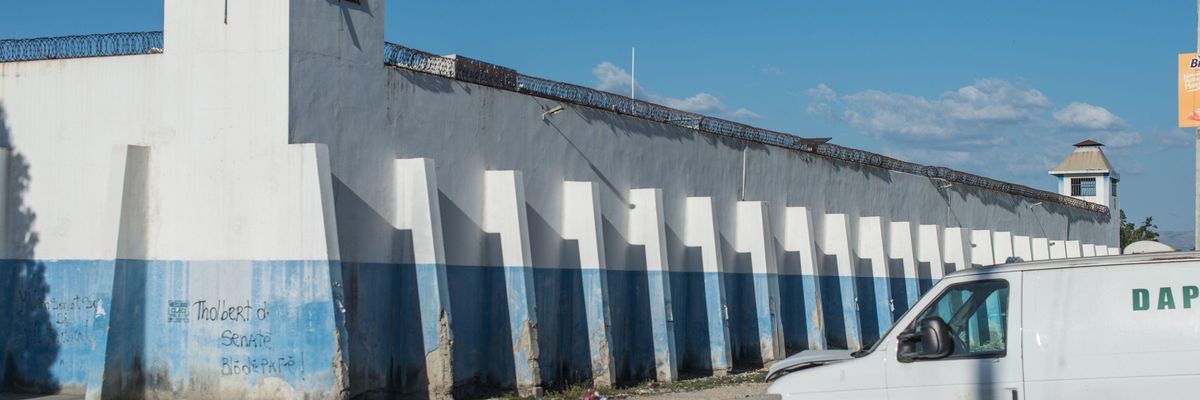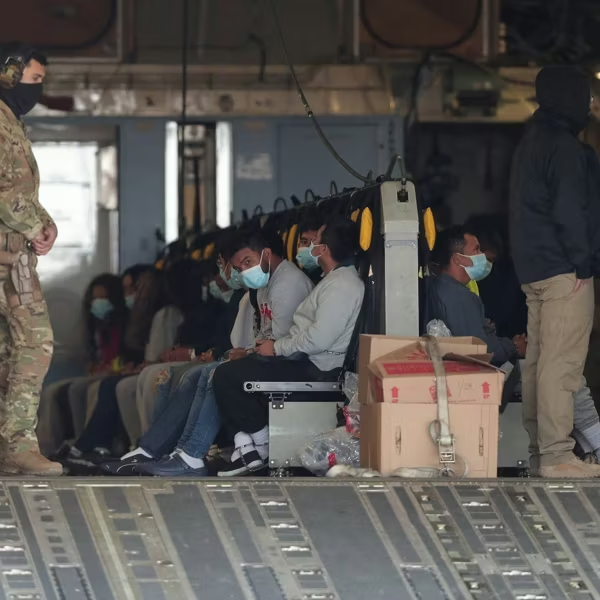
The Croix-des-Bouquets prison in a suburb of Port-au-Prince, Haiti is seen on February 25, 2021. (Photo: Reginald Louissaint Jr./AFP via Getty Images)
Additional Prison Inmates Starve to Death as Crisis Worsens in Haiti
The United Nations is urging Haiti to address the food, water, and medicine shortages imperiling its incarcerated population.
At least eight inmates died this week at a jam-packed prison in Haiti that ran out of food two months ago, becoming the latest victims of an ongoing crisis that has killed dozens of people this year.
Ronald Richemond, the government commissioner of the southwest city of Les Cayes, told The Associated Press on Thursday that hunger and dangerously high temperatures contributed to the deaths reported this week by the prison, which holds 833 inmates.
"Whoever can help should help immediately because the prisoners are in need," said Richemond.
According to a United Nations Security Council report released last week, Haiti documented 54 prison deaths related to malnutrition from January to April alone.
As AP reported:
The country's severely overcrowded prison system has long struggled to provide food and water to inmates. It blames insufficient government funds and the problem has worsened in recent months, leading to a new rise in severe malnutrition and deaths.
By law, prisons in Haiti are required to provide inmates with water and two meals a day, which usually consist of porridge and a bowl of rice with fish or some type of meat.
But in recent months, inmates have been forced to rely solely on friends or family for food and water, and many times they are unable to visit because gang-related violence makes some areas impassable, said Michelle Karshan, co-founder of the nonprofit Health through Walls, which provides health care in Haiti's prisons.
The nonprofit joined three other organizations this year to feed the roughly 11,000 inmates in Haiti's 20 prisons for three months, helping at a time when the country was increasingly unstable following the July 7 killing of President Jovenel Moise.
Despite these efforts, the incarcerated population's predicament has continued to worsen as conditions throughout Haiti, home to 11 million people, have deteriorated over the past year.
A spike in gang violence following Moise's assassination "has blocked the main roads leading out of Haiti's capital," AP reported, "making it extremely difficult to distribute food and other supplies to the rest of the country."
With a water pump that the Les Cayes prison relies on long broken, relatives and friends of inmates have been forced to carry buckets of water for miles.
Just weeks after Moise was assassinated, the impoverished Caribbean island nation was devastated by a 7.2 magnitude earthquake that killed more than 2,200 people and destroyed or damaged thousands of buildings. Many cities in the southwestern part of the country are still struggling to recover from that disaster.
After some cells in the Les Cayes prison were destroyed, authorities responded by pushing even more people into less space.
"The cell occupancy rate in Haiti stands at more than 280% of capacity, with 83% of inmates stuck in pretrial detentions that in some cases can drag on for more than a decade before an initial court appearance," AP reported.
In its report, the U.N. Security Council urged Haiti's government "to take the necessary measures to find a long-lasting solution to the prison food, water, and medicine crisis."
An Urgent Message From Our Co-Founder
Dear Common Dreams reader, The U.S. is on a fast track to authoritarianism like nothing I've ever seen. Meanwhile, corporate news outlets are utterly capitulating to Trump, twisting their coverage to avoid drawing his ire while lining up to stuff cash in his pockets. That's why I believe that Common Dreams is doing the best and most consequential reporting that we've ever done. Our small but mighty team is a progressive reporting powerhouse, covering the news every day that the corporate media never will. Our mission has always been simple: To inform. To inspire. And to ignite change for the common good. Now here's the key piece that I want all our readers to understand: None of this would be possible without your financial support. That's not just some fundraising cliche. It's the absolute and literal truth. We don't accept corporate advertising and never will. We don't have a paywall because we don't think people should be blocked from critical news based on their ability to pay. Everything we do is funded by the donations of readers like you. Will you donate now to help power the nonprofit, independent reporting of Common Dreams? Thank you for being a vital member of our community. Together, we can keep independent journalism alive when it’s needed most. - Craig Brown, Co-founder |
At least eight inmates died this week at a jam-packed prison in Haiti that ran out of food two months ago, becoming the latest victims of an ongoing crisis that has killed dozens of people this year.
Ronald Richemond, the government commissioner of the southwest city of Les Cayes, told The Associated Press on Thursday that hunger and dangerously high temperatures contributed to the deaths reported this week by the prison, which holds 833 inmates.
"Whoever can help should help immediately because the prisoners are in need," said Richemond.
According to a United Nations Security Council report released last week, Haiti documented 54 prison deaths related to malnutrition from January to April alone.
As AP reported:
The country's severely overcrowded prison system has long struggled to provide food and water to inmates. It blames insufficient government funds and the problem has worsened in recent months, leading to a new rise in severe malnutrition and deaths.
By law, prisons in Haiti are required to provide inmates with water and two meals a day, which usually consist of porridge and a bowl of rice with fish or some type of meat.
But in recent months, inmates have been forced to rely solely on friends or family for food and water, and many times they are unable to visit because gang-related violence makes some areas impassable, said Michelle Karshan, co-founder of the nonprofit Health through Walls, which provides health care in Haiti's prisons.
The nonprofit joined three other organizations this year to feed the roughly 11,000 inmates in Haiti's 20 prisons for three months, helping at a time when the country was increasingly unstable following the July 7 killing of President Jovenel Moise.
Despite these efforts, the incarcerated population's predicament has continued to worsen as conditions throughout Haiti, home to 11 million people, have deteriorated over the past year.
A spike in gang violence following Moise's assassination "has blocked the main roads leading out of Haiti's capital," AP reported, "making it extremely difficult to distribute food and other supplies to the rest of the country."
With a water pump that the Les Cayes prison relies on long broken, relatives and friends of inmates have been forced to carry buckets of water for miles.
Just weeks after Moise was assassinated, the impoverished Caribbean island nation was devastated by a 7.2 magnitude earthquake that killed more than 2,200 people and destroyed or damaged thousands of buildings. Many cities in the southwestern part of the country are still struggling to recover from that disaster.
After some cells in the Les Cayes prison were destroyed, authorities responded by pushing even more people into less space.
"The cell occupancy rate in Haiti stands at more than 280% of capacity, with 83% of inmates stuck in pretrial detentions that in some cases can drag on for more than a decade before an initial court appearance," AP reported.
In its report, the U.N. Security Council urged Haiti's government "to take the necessary measures to find a long-lasting solution to the prison food, water, and medicine crisis."
At least eight inmates died this week at a jam-packed prison in Haiti that ran out of food two months ago, becoming the latest victims of an ongoing crisis that has killed dozens of people this year.
Ronald Richemond, the government commissioner of the southwest city of Les Cayes, told The Associated Press on Thursday that hunger and dangerously high temperatures contributed to the deaths reported this week by the prison, which holds 833 inmates.
"Whoever can help should help immediately because the prisoners are in need," said Richemond.
According to a United Nations Security Council report released last week, Haiti documented 54 prison deaths related to malnutrition from January to April alone.
As AP reported:
The country's severely overcrowded prison system has long struggled to provide food and water to inmates. It blames insufficient government funds and the problem has worsened in recent months, leading to a new rise in severe malnutrition and deaths.
By law, prisons in Haiti are required to provide inmates with water and two meals a day, which usually consist of porridge and a bowl of rice with fish or some type of meat.
But in recent months, inmates have been forced to rely solely on friends or family for food and water, and many times they are unable to visit because gang-related violence makes some areas impassable, said Michelle Karshan, co-founder of the nonprofit Health through Walls, which provides health care in Haiti's prisons.
The nonprofit joined three other organizations this year to feed the roughly 11,000 inmates in Haiti's 20 prisons for three months, helping at a time when the country was increasingly unstable following the July 7 killing of President Jovenel Moise.
Despite these efforts, the incarcerated population's predicament has continued to worsen as conditions throughout Haiti, home to 11 million people, have deteriorated over the past year.
A spike in gang violence following Moise's assassination "has blocked the main roads leading out of Haiti's capital," AP reported, "making it extremely difficult to distribute food and other supplies to the rest of the country."
With a water pump that the Les Cayes prison relies on long broken, relatives and friends of inmates have been forced to carry buckets of water for miles.
Just weeks after Moise was assassinated, the impoverished Caribbean island nation was devastated by a 7.2 magnitude earthquake that killed more than 2,200 people and destroyed or damaged thousands of buildings. Many cities in the southwestern part of the country are still struggling to recover from that disaster.
After some cells in the Les Cayes prison were destroyed, authorities responded by pushing even more people into less space.
"The cell occupancy rate in Haiti stands at more than 280% of capacity, with 83% of inmates stuck in pretrial detentions that in some cases can drag on for more than a decade before an initial court appearance," AP reported.
In its report, the U.N. Security Council urged Haiti's government "to take the necessary measures to find a long-lasting solution to the prison food, water, and medicine crisis."

